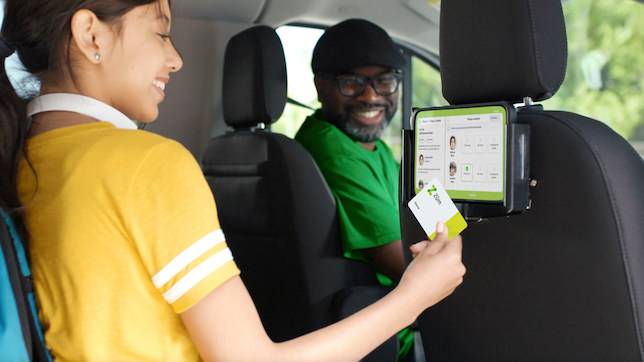Zum Unveils More Safety Features for Its Student Transportation Platform
App, RFID Technology Allows Schools, Parents to See Real-Time Location of Students, Drivers
- By Kristal Kuykendall
- 12/09/21
Zum, the connected-ride service for K–12 students, has announced new safety features coming in early 2022.
Since introducing a single, real-time interface connecting students and parents with school bus drivers, schools, and administrators, Zum has been expanding its footprint and expanding its student-ride services as well as growing the number of districts using Zum’s platform in districts’ existing transportation systems. The platform is now used by more than 4,000 U.S. schools, the company said.
The platform uses RFID technology to allow parents and schools to track students and their rides in real time; students scan their chip-enabled Zum card as they enter and exit the school bus.

“Districts administrators and operators are able to track rides in a map view from start to finish and routes are adjusted in real-time to account for absent students or traffic issues,” the company said in a news release. “At the same time, drivers are able to preview all students on assigned routes, along with important, supplemental information for each student where necessary,” such as alerting drivers to students’ special needs.
Beginning Jan. 1, daily safety checks by the drivers will also be digitized as part of the platform experience, simplifying and streamlining the process of confirming each bus is in good condition before any students are on board.
Another new safety feature Zum will roll out in 2022 is integrating its student information with the school districts it serves, the company said. The platform already includes student profiles, photos, any special instructions, and customized route details for each student rider. Merging these profiles with the districts’ student information systems will better equip drivers to verify drop-offs and pick-ups; will increase the accuracy of student profiles to greater than 90%; and will ensure drivers are fully informed about every student’s special needs, the company said.
To increase post-ride safety and help ensure no student is overlooked and left on a school bus after a route is completed, Zum said it will install digital tags throughout every vehicle within its system; the tags must be scanned as part of each driver’s end-of-day routine, eliminating the potential for errors in the “last stop, last check” process.
For more information about Zum’s safety features and student transportation services, visit RideZum.com.
About the Author
Kristal Kuykendall is editor, 1105 Media Education Group. She can
be reached at [email protected].